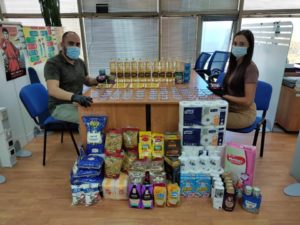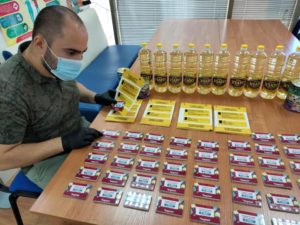Since late spring AFEW Kazakhstan, a partner of AFEW International, has been implementing the project “Protecting the rights of vulnerable groups during the COVID-19 pandemic in Almaty”, with the support of the Embassy of the Kingdom of the Netherlands. During the first 2 months of the project the organization managed to help more than 500 Almaty residents!
 Alexandra Li, project manager, told us about the history of the project and its goals, as well as about how important the joint work of NGOs is for vulnerable groups of the population.
Alexandra Li, project manager, told us about the history of the project and its goals, as well as about how important the joint work of NGOs is for vulnerable groups of the population.
Alexandra, how serious was the impact of COVID on vulnerable groups in Kazakhstan, in particular women living with HIV?
The coronavirus crisis has exposed and exacerbated already existing inequalities in Kazakhstan. Obviously, the disease especially affects those living with underlying and concomitant diseases. At the same time, the social restrictions that appeared due to the virus led to an increase in gender (domestic) violence, as well as a decrease in income, limiting the access of the most disadvantaged groups to housing, food, hygiene, etc. There is another nuance, which is that significant medical and social support to vulnerable groups is now provided by nongovernmental organizations, and due to the crisis, their employees are faced with restrictions on movement and the inability to apply security measures, which, in turn, depend on international funding.
During this crisis women belonging to vulnerable groups (sex workers, drug users, migrants, ex-prisoners), especially women living with HIV or other diseases, as well as LGBT people, face violations of their human rights, difficulty accessing health care, and socio-economic problems. Obviously, these groups have health risks which are exacerbated by social exclusion, and the need for healthcare services to concentrate on dealing with COVID-19 instead of HIV treatments exacerbates these issues. These people need basic foods, hygiene products, special health services such as HIV treatment and opioid substitution therapy, ways to protect themselves and their rights, and psychological assistance.
What is the background of the project. Why did the Dutch Embassy decide to support vulnerable groups in Kazakhstan?
For the Dutch Embassy, women’s and LGBT rights have always been a priority. This project is primarily about legal literacy and protection of rights, which became even more relevant during quarantine. With extensive experience working with vulnerable groups in Kazakhstan, we had the idea for this hugely necessary project, and we applied to the Embassy of the Netherlands. It’s great that the embassy keeps up with the times and responds promptly to emergency situations, in particular Covid-19; we are very grateful for that. I was pleasantly surprised by the fact that the process of considering an application, signing a contract and receiving money did not take months, but, on the contrary, happened very quickly. In April we submitted an application, and by May 20th we had already started implementing the project.
What does the project involve?
As part of the project, we provide legal advice, psychological support (consultations, information), as well as other humanitarian assistance – for example, we distribute food and hygiene products to people.
 You involve local NGOs in the project. How are they selected?
You involve local NGOs in the project. How are they selected?
We have been working with many NGOs for a very long time. Collaboration gives good results. For this project, we selected several social workers with whom we have previously collaborated and who have experience working with delinquency. We also have a professional lawyer / mentor in our project – Maria Rasulova. At the launch stage of the project, she conducted a training session for paralegals, during which she discussed topics people had requested, as well as ways of influencing offenses during the Covid-19 pandemic.
How do people react to your help?
In most cases, we receive tearful words of gratitude. And this is understandable, because many people were left without work and faced very difficult financial situations.
There was a particularly interesting case in which employees of a medical organization turned to paralegals with a request to help a client to apply for benefits due to poor health. She had undergone spinal surgery and had great difficulty moving around and she lived with her three grandchildren. The paralegals helped to collect the necessary documents for applying for the allowance, we provided her with humanitarian aid, and also organized a campaign on Facebook, thanks to which we were able to collect food, various items and toys for the children. We were surprised by how many people helped! We were even able to give the family a refrigerator and a TV. The client is now receiving benefits and is on the mend.
How many people did you manage to help during the project?
During the first two months of the project, we provided humanitarian assistance to 120 people, 80 people received help from a psychologist, 352 received legal advice, 94 cases were registered, and 64 cases were resolved.
 You are also running a humanitarian project that provides food to disadvantaged people. How does it work?
You are also running a humanitarian project that provides food to disadvantaged people. How does it work?
We give people vouchers for “Magnum”, the largest trading network. Which these customers can independently choose what they need in the store, except for alcoholic beverages and tobacco products. If we have a client who cannot walk for health reasons, we offer him a standard package, which includes meat, condensed milk, sugar, flour, sunflower oil, pasta, salt, rice, buckwheat, oatmeal, shampoo, liquid soap, shower gel, talcum powder and toilet paper. We buy these products ourselves and deliver them to people. We also take into account dietary preferences – if there´s something on the standardized list that the client can´t have, we replace it with something else.
Where do people in need find information about you?
Generally, all clients in need contact us through paralegals. But we also post information on social networks – requests for help can also come from there.
What are your future plans?
This project will run until the end of 2020. But we have already submitted an application to the register of social projects, and we hope that potential investors will be interested and will support the project.



